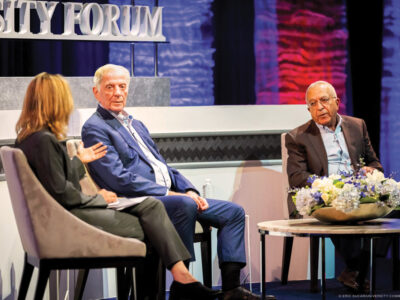
Two national-security heavyweights discuss how to avert “a million” deaths on the Korean peninsula.
Retired Navy Admiral James Stavridis is not some unhinged TV bloviator. He headed US Southern Command under George W. Bush, served as NATO supreme allied commander during Barack Obama’s presidency, was considered by Hillary Clinton as a vice presidential running mate, and met with Donald Trump W’68 to discuss a cabinet position.
So it was all the more alarming when, on campus in late September, he put the odds of “full-blown” nuclear war between the United States and North Korea at 10 percent. “That is well over double what it was three months ago,” he added, “and I think there is additionally a 20 to 30 percent chance of a conventional exchange of ordinance … so you’re approaching a better-than-even chance.”
Because of the 11,000 artillery pieces trained on US forces in Korea and the 25 million residents of metropolitan Seoul, “It is hard for me to see less than 500,000 to a million” casualties even in a non-nuclear scenario, he said.
Stavridis joined former Undersecretary of Defense for Policy Michèle Flournoy at the Perry World House to explore the “future of the international security environment” in a discussion moderated by Yochi Dreazen C’99, the deputy managing editor of Vox [“Healing Invisible Wounds,” Sep|Oct 2015].
Flournoy was no more sanguine than Stavridis. She recalled encountering a “very high-level North Korean defector” in a 2016 meeting brokered by South Korea’s intelligence agency. “We asked him this question: Is Kim Jong Un crazy?” she recalled. “His main message was: Do not underestimate him. He is young and he is inexperienced, but he is extremely focused on his objectives, he is rational, and he is brutal and ruthless.”
Furthermore, Stavridis interjected, “He has demonstrated again and again the ability to get ahead of us in the decision cycle.”
That dynamic, combined with Trump’s reactivity—which had lately progressed from an itchy Twitter finger to taunts at the UN General Assembly—had both experts fearful.
“All this heated rhetoric,” Flournoy said, has made it “more likely now that one side or the other will misread” a signal, prompting a “miscalculation that actually starts a war.”
“We need our president to sound a little less like a character out of Game of Thrones,” Stavridis pleaded, “and more like Cool Hand Luke.” He added: “I think the person who is doing the latter is [Defense] Secretary [James] Mattis, who I think manages to avoid the rhetoric but conveys a real sense of consequence.”
What, exactly, should trigger consequences, given the present state of North Korea’s weapons program?
“Can we live with a nuclear North Korea?” Dreazen asked. “Can we contain it as Russia was contained during the Cold War?” Former National Security Advisor Susan Rice, he noted, has said yes. Current National Security Advisor H. R. McMaster has said no.
A denuclearized Korean peninsula “is the right goal,” said Flournoy. “The question is about sequencing. Right now the administration is talking as if denuclearization has to happen upfront. And I just don’t think that’s realistic.” Absolute ultimatums, she suggested, were less likely to work than “coercive diplomacy” presenting China with a choice: pressure North Korea to come to the negotiating table, or prepare for a US military buildup that amplifies the risk of war. The US’s immediate goals should be halting live tests of nuclear bombs and ICBMs. “Once we’ve achieved that, we can talk about the longer-term conditions that would get us toward denuclearization.”
Stavridis agreed and added three more recommendations: intensify cyber campaigns against North Korea’s military, invest in “boost-phase” anti-missile defense, and impose maritime interdiction. “Build the hard-power piece in order to encourage execution on the soft-power side, the diplomatic side,” he said.
Voicing anxiety that transcends the North Korea situation, both speakers lamented what they saw as a deliberate erosion of diplomatic capabilities by the Trump administration. Flournoy worried about a “brain drain” within the State Department spurred by Secretary of State Rex Tillerson’s announced plans to shrink its footprint.
“A lot of my friends joined the State Department or the Pentagon out of deep patriotism,” Dreazen remarked. “Almost universally they are trying to leave government.”
“Hard power so often is the short-term necessity,” Stavridis said. “We’re not going to negotiate a solution with the Islamic State.
“But the long game is on the soft-power side … And we ought to remember, it’s not just State Department. I agree with everything you said, but I’m going to add AID [the US Agency for International Development]. These are real heroes, who stand right next to the military in the field. Our guys and gals are wearing body armor and helmets. Meanwhile the AID folks are there with a clipboard and a flip phone. They are real heroes, and they are also part of these huge cuts. It’s shortsighted, and it will undercut us.” —TP




